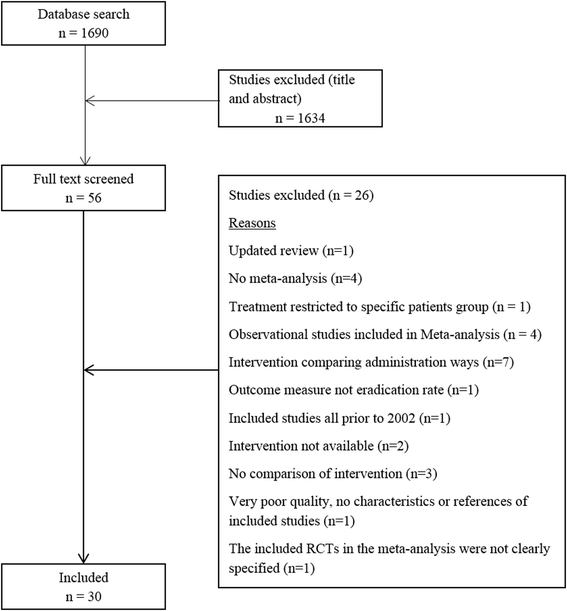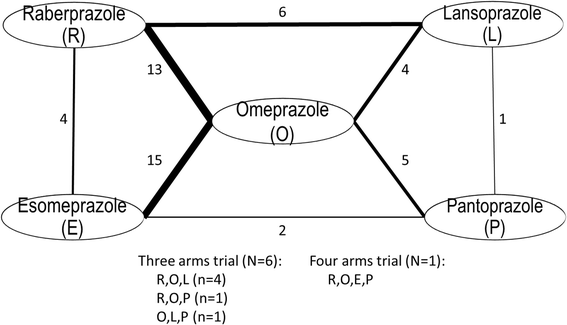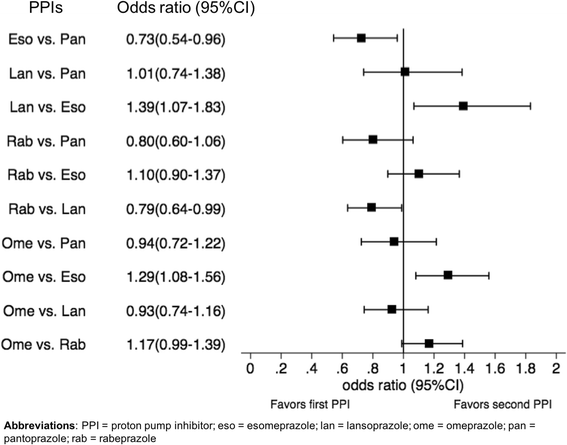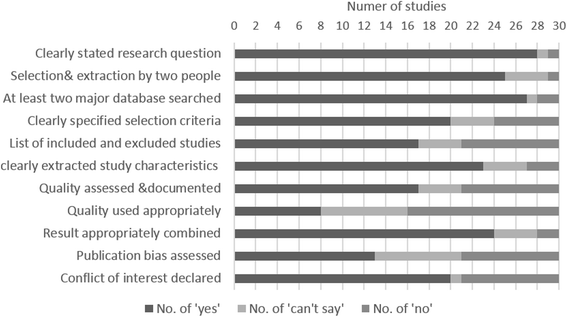Pharmacological regimens for eradication of Helicobacter pylori: an overview of systematic reviews and network meta-analysis
- PMID: 27460211
- PMCID: PMC4962503
- DOI: 10.1186/s12876-016-0491-7
Pharmacological regimens for eradication of Helicobacter pylori: an overview of systematic reviews and network meta-analysis
Abstract
Background: Approximately half of the world's population is infected with Helicobacter pylori (H.pylori), a bacterium shown to be linked with a series of gastrointestinal diseases. A growing number of systematic reviews (SRs) have been published comparing the effectiveness of different treatments for H.pylori infection but have not reached a consistent conclusion. The objective of this study is to provide an overview of SRs of pharmacological therapies for the eradication of H.pylori.
Methods: Major electronic databases were searched to identify relevant SRs published between 2002 and February 2016. Studies were considered eligible if they included RCTs comparing different pharmacological regimens for treating patients diagnosed as H.pylori infected and pooled the eradication rates in a meta-analysis. A modified version of the 'A Measurement Tool to Assess Systematic Reviews' (AMSTAR) was used to assess the methodological quality. A Bayesian random effects network meta-analysis (NMA) was conducted to compare the different proton pump inhibitors (PPI) within triple therapy.
Results: 30 SRs with pairwise meta-analysis were included. In triple therapy, the NMA ranked the esomeprazole to be the most effective PPI, followed by rabeprazole, while no difference was observed among the three old generations of PPI for the eradication of H.pylori. When comparing triple and bismuth-based therapy, the relative effectiveness appeared to be dependent on the choice of antibiotics within the triple therapy; moxifloxacin or levofloxacin-based triple therapy were both associated with greater effectiveness than bismuth-based therapy as a second-line treatment, while bismuth-based therapy achieved similar or greater eradication rate compared to clarithromycin-based therapy. Inconsistent findings were reported regarding the use of levofloxacin/moxifloxacin in the first-line treatment; this could be due to the varied resistant rate to different antibiotics across regions and populations. Critical appraisal showed a low-moderate level of overall methodological quality of included studies.
Conclusions: Our analysis suggests that the new generation of PPIs and use of moxifloxacin or levofloxacin within triple therapy as second-line treatment were associated with greater effectiveness. Given the varied antibiotic resistant rate across regions, the appropriateness of pooling results together in meta-analysis should be carefully considered and the recommendation of the choice of antibiotics should be localized.
Keywords: Eradication; Helicobacter pylori; Network meta-analysis; Systematic review.
Figures




Similar articles
-
Optimum duration of regimens for Helicobacter pylori eradication.Cochrane Database Syst Rev. 2013 Dec 11;2013(12):CD008337. doi: 10.1002/14651858.CD008337.pub2. Cochrane Database Syst Rev. 2013. PMID: 24338763 Free PMC article.
-
Sequential versus standard triple first-line therapy for Helicobacter pylori eradication.Cochrane Database Syst Rev. 2016 Jun 28;2016(6):CD009034. doi: 10.1002/14651858.CD009034.pub2. Cochrane Database Syst Rev. 2016. PMID: 27351542 Free PMC article.
-
Efficacy of second-line regimens for Helicobacter pylori eradication treatment: a systemic review and network meta-analysis.BMJ Open Gastroenterol. 2020 Sep;7(1):e000472. doi: 10.1136/bmjgast-2020-000472. BMJ Open Gastroenterol. 2020. PMID: 32883715 Free PMC article.
-
Helicobacter pylori and gastric or duodenal ulcer.Prescrire Int. 2016 Jan;25(167):18-23. Prescrire Int. 2016. PMID: 26942258
-
Systemic pharmacological treatments for chronic plaque psoriasis: a network meta-analysis.Cochrane Database Syst Rev. 2017 Dec 22;12(12):CD011535. doi: 10.1002/14651858.CD011535.pub2. Cochrane Database Syst Rev. 2017. Update in: Cochrane Database Syst Rev. 2020 Jan 9;1:CD011535. doi: 10.1002/14651858.CD011535.pub3. PMID: 29271481 Free PMC article. Updated.
Cited by
-
Evaluation of the Direct Economic Cost per Eradication Treatment Regimen against Helicobacter pylori Infection in Greece: Do National Health Policy-Makers Need to Care?Medicina (Kaunas). 2020 Mar 18;56(3):133. doi: 10.3390/medicina56030133. Medicina (Kaunas). 2020. PMID: 32197498 Free PMC article.
-
Practice guidelines for the management of Helicobacter pylori infection: The Saudi H. pylori Working Group recommendations.Saudi J Gastroenterol. 2023 Nov-Dec;29(6):326-346. doi: 10.4103/sjg.sjg_288_22. Saudi J Gastroenterol. 2023. PMID: 36204804 Free PMC article.
-
Brief communication: global temporal trends in the efficacy of clarithromycin-based regimens for the treatment of Helicobacter pylori infection.Therap Adv Gastroenterol. 2023 Jun 22;16:17562848231167284. doi: 10.1177/17562848231167284. eCollection 2023. Therap Adv Gastroenterol. 2023. PMID: 37388121 Free PMC article.
-
Standard-Dose Proton Pump Inhibitors in the Initial Non-eradication Treatment of Duodenal Ulcer: Systematic Review, Network Meta-Analysis, and Cost-Effectiveness Analysis.Front Pharmacol. 2019 Jan 7;9:1512. doi: 10.3389/fphar.2018.01512. eCollection 2018. Front Pharmacol. 2019. PMID: 30666204 Free PMC article.
-
Potassium-Competitive Acid Blocker and Proton Pump Inhibitor-Based Regimens for First-Line Helicobacter pylori Eradication: A Network Meta-Analysis.Gastro Hep Adv. 2022 Jun 17;1(5):824-834. doi: 10.1016/j.gastha.2022.06.009. eCollection 2022. Gastro Hep Adv. 2022. PMID: 39131848 Free PMC article.
References
Publication types
MeSH terms
Substances
LinkOut - more resources
Full Text Sources
Other Literature Sources
Medical

